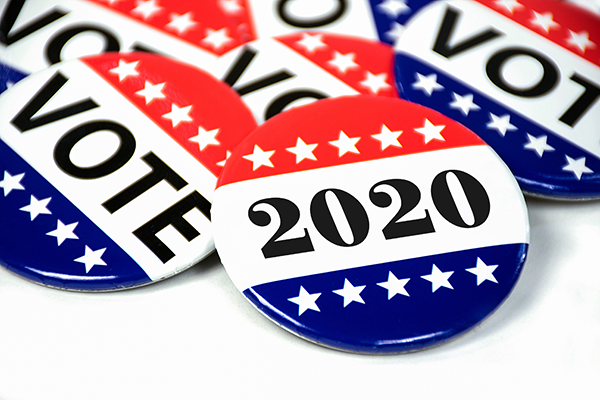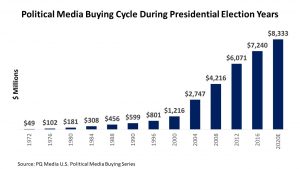
Contributor: Leo Kivijarv, Ph.D., Executive Vice President & Director of Research, PQ Media
Just to recap, based on previous elections, PQ Media projects that political media buying could exceed $8 billion in 2020, possibly as high as $8.5 billion. Monies have already been spent in 2019 that exceed 2015 figures, particularly on marketing services like public relations, direct marketing, telemarketing, promotional products, experiential marketing and market research.

Senate Races
PQ Media believes that there will be a significant jump in media buying in the Senate races. Most of the contentious races in 2016 were Democratic-held seats, as only nine Republican seats were in play, half in safe southern states. In the 2020 elections, there are 33 open seats, of which 23 are currently held by Republicans. The recent uproar over abortion rights might lead some historically red states to turn purple or blue. Concurrently, will the Republican seats also be in jeopardy if the Senators continue to support Trump if there are impeachment proceedings during the elections, and negative information is discovered? If history is any indication, there was a Democratic wave immediately after Nixon resigned.
House Races
It is much too early to predict House races. During the 2018 election, the Republicans were favored to hold onto to the House during January polling, but as the year worn on, the pendulum swung deeply in favor of the Democrats by July. Former safe seats became contentious. Only two Democrat seats switched, compared with almost three dozen Republican seats. Currently, there is no indication that the Republicans have an opportunity to reverse course, given the continuing stonewalling by the current administration to bring the truth out about obstruction, which isn’t playing well with independents.
Where Does Radio Fit In?
PQ Media is predicting that radio should get a significant boost during the 2020 elections, primarily due to the fifth baseline factor: voter turnout. In particular, radio growth will be predicated on how much the Democratic Party spends to increase the turnout of multicultural voters. Some believe the 2016 elections turned on weaker turnout by African Americans in the key states that Trump surprisingly won — Wisconsin and Michigan. The Democrats also examined data that showed a larger share of Hispanics voted Republican in 2016 compared with 2012 in close races that the Democrats thought they had won — Pennsylvania, North Carolina and Florida. Successful, get-out-and-vote grassroots campaigns were run in many of these states during the 2018 elections, which we think will be repeated in 2020, and subsequently with more financial resources than 2018. Why is this good for radio? African Americans and Hispanics over-index the overall population in radio listenership. Multicultural agencies have reported that their political client rosters are growing substantially, when compared with the 2016 and 2018 elections. As such, radio is a very important component of the omnichannel political campaign strategy to reach multicultural audiences with messages that are culturally relevant. Therefore, PQ Media is predicting that radio will register a gain slightly above the overall political media buying growth rate in 2020.
Elephant in the Room: Impeachment?
Almost everything I’ve written gets thrown out the window if impeachment proceedings begin in earnest and information is discovered that requires some form of action, whether it be Trump voluntarily stepping down to avoid further embarrassment (highly unlikely), to Trump’s vindication of all charges (highly unlikely), to his removal from office before the November 2020 elections.
Despite the posturing announcements by some Democratic candidates to go forward with an impeachment investigation, the Democratic Party has been hesitant to press on. They believe that the Republican Party is in a very vulnerable position with Trump remaining as President throughout the campaign, particularly among independents and suburban moms who helped the Democrats win the House during the 2018 election. If the impeachment hearings don’t have an absolute, definite outcome, two things could happen that would be a disadvantage to Democratic candidates across all races. First, the independent voters might have empathy for Trump’s plight and begin to believe the “witch hunt” propaganda rhetoric. Second, Trump’s loyal Republican base will view him as a martyr and be empowered to become more engaged in the voting process to offset any gains the Democrats should exhibit from the aforementioned multicultural voter turnout.
Even if the impeachment investigation uncovers evidence that unquestionably sheds light that Trump acted illegally, all hell could break loose. Will Trump dodge the accusations and try to control the public opinion conversation, thereby averting attention away from the Democratic messages in key states? Will Republican candidates in tight races have to choose between losing Trump’s loyal base if they don’t support him on the campaign trail or the independent voters and suburban moms who are disgusted by the continued support of Trump? Will some Republicans leaders plead for Trump to drop out of the race, and subsequently have other Republicans join the race in hopes of saving the party from a rout, thereby increasing political media buying even more than projected in this blog post?
That’s why it’s way too early to honestly take out the crystal ball. I’ve been vague on purpose because I’ve never seen so many variables with uncertain outcomes at this juncture of the election process. For example, I’ve also not touched upon other hot button issues that could affect this election, such as the controversial citizenship questions on the U.S. Census that have yet to be settled, to whether the Russians will again attempt to illegally impact the election results in Trump’s favor. Thus, this blog will be considered a work in progress and I’ll provide updates when enough of the stars align to cause a change in the forecast of political media buying.

